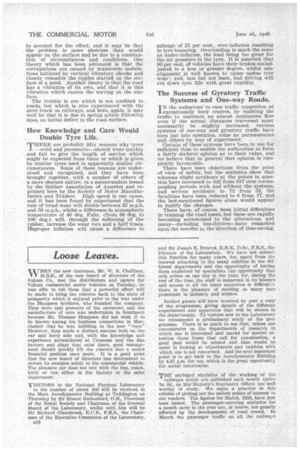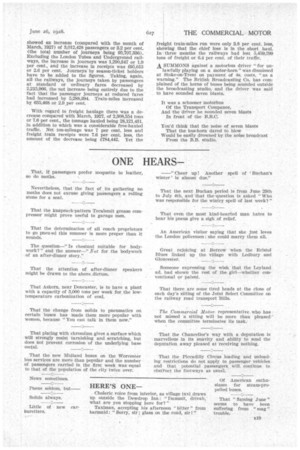Loose Leaves.
Page 44

Page 45

If you've noticed an error in this article please click here to report it so we can fix it.
NITHEN the new chairman, Mr. W. R. Challinor, M.B.E., of the new board of directors of the Vulcan Co., met the distributors and agents for Vulcan commercial motor vehicles on Tuesday, he was able to tell them that a powerful effort will be made to bring the concern back to the state of prosperity which it enjoyed prior to the war under the Flampson brothers, who founded the company. They were real pioneers of the motorcar, and the manufacture of cars was undertaken in Southport because Mr. Thomas Hampson did not wish it to be known among his business connections in Manchester that he was dabbling in the new " toys." However, they made a distinct success both on the car and lorry side and, with the knowledge and experience accumulated at Crossens and the fine factory and plant that exist• there, good management should guiddy lift the concern into a sound financial position once more. It is a good point that the new board of directors has determined to devote its energies solely to the commercial vehicle. The pleasure car does not mix with the bus, coach, lorry or van either in the factory or the sales department.
VISITORS to the National Physical Laboratory to the number of about 400 will be received in the Main Aerodynamics Building at Teddington on Thursday by Sir Ernest Rutherford, 0.M., President of the Royal Society and Chairman of the General Board of the Laboratory, whilst with him will be Sir Richard Glazebrook, K.C.B., F.R.S., the Chairman of the Executive Committee of the Laboratory, s18
and Sir Joseph E. Petavel, K.B.E., D.Sc., F.R.S., the Director of the Laboratory. We have not missed this function for many years, for, apart from the interest attaching to the many exhibits in the different departments and the opportunity of having them explained by specialists (an opportunity that only arises on one day in the year, for, during the rest of the time, the staff is immersed in its labours and access to_ all the inner mysteries is difficult 1) there is the pleasure of meeting so many men prominent in industry and science.
Invited guests will have received by post a copy of the programme, giving details of the different experiments and apparatus that will be shown in the departments. To visitors new to the Laboratory we recommend a preliminary study of the programme. There is so much to see that, unless one concentrates on the departments, of research in which one is interested and marks for special attention ,those items that call for examination, a good deal would be missed and time would be spent in looking at eiperiments and exhibits with which one is not concerned. And the next important point is to get back to the Aerodynamics Building by 4.15 p.m. for tea, which is the great opportunity for social intercourse.
THE abridged statistics of the working of the railways which are published each month (price 3s. 6d., by His Majesty's Stationery Office) are well worthy of study. We make a practice in this column of picking out the salient points of interest to our readers. The figures for March, 1928, have just been issued. The passenger-carrying statistics for a month early in the year are, of course, not greatly affected by the developments of road travel. in March the passenger traffic on all the railways showed an increase (compared with the month of March, 1927) of 3,012,428 passengers or 32 per cent. (the total number of journeys being 95,707,336). Excluding the London Tubes and Underground railways, the increase in journeys was 1,290,347 or 1.9 per cent., and the increase in receipts was £95,013 or 2.6 per cent. Journeys by season-ticket holders have to be added to the figures. Taking, again, all the railways, the journeys taken by passengers at standard or ordinary fares decreased by 2,215,966, the net increase being entirely due to the fact that the passenger journeys at reduced fares had increased by 5,288,394. Train-miles increased by 635,468 or 2.9 per cent.
With regard to freight haulage there was a decrease compared with March, 1927, of 2,308,554 tons or 7.6 per cent., the tonnage hauled being 28,121,431, in addition to which was a considerable free-hauled traffic. Net ton-mileage was 7 per cent, less and freight train receipts were 7.6 per cent, less, the amount of the decrease being 1784,442. Yet the freight train-miles run were only 3.8 per cent, less, showing that the chief loss is in the short haul. In three months the railways had lost 5,459799 tons of freight or 6.4 per cent, of their traffic.
A SUMMONS against a motorbus driver " for un lawfully playing on a motor-horn" was dismissed at Stoke-on-Trent on payment of 4s. costs, "as a warning." The British Broadcasting Co. has complained of the horns of buses being sounded outside the broadcasting studio, and the driver was said to have sounded seven blasts.
It was a schooner motorbus Of the Transport Companee, And the driver he sounded seven blasts In front of the B.B.C.
You'd think that the noise of seven blasts That the bus-horn dared to blow Would be easily drowned by the noise broadcast From the B.B. studio.




















































































































